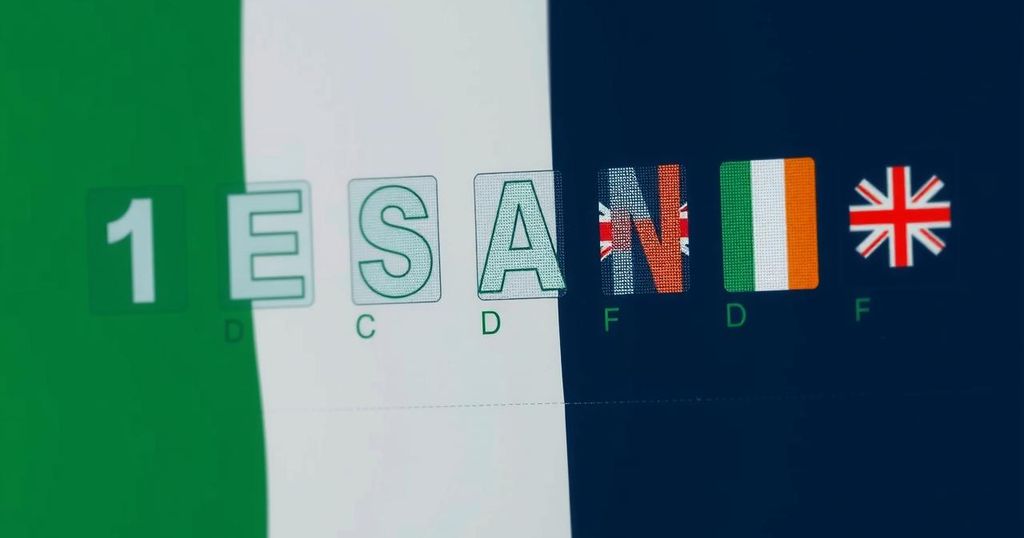Politics
AFRICA, AP, BALLINLOUGH, BEECHWOOD PARK, BRIAN LAWLESS, BURKINA FASO, CORK, COUNTY WICKLOW, DEFENCE, DELGANY, DELGANY NATIONAL SCHOOL, DUBLIN, ELECTION, EUROPE, FIA, FIANNA FAIL, FINE, FINE GAEL, GOLA, GOVERNMENT, GOVERNMENT BUILDINGS, IRELAND, ISLAND OF GOLA, JACOB KING, LOCAL NEWS, NEWS, NIALL CARSON, PA, PARLIAMENTARY SEATS, PETER MORRISON, SCHOOL, SIMON HARRIS, SINN FEIN, ST ANTHONY ’ S BOYS ’ SCHOOL
Marcus Li
0 Comments
Counting Commences in Ireland’s Election Amidst Close Party Competition
Vote counting has begun in Ireland’s 2024 general election, revealing a close contest among Fine Gael, Fianna Fáil, and Sinn Féin. The exit polls indicate the three parties are nearly tied, with key issues being the housing crisis and immigration. Following the elections, possible coalition negotiations are anticipated, particularly if Sinn Féin emerges as a leading party, despite historical opposition from the other two major parties. The complexity of Ireland’s electoral system may prolong the announcement of full results.
Counting has begun in Ireland’s general election, a contest marked by intense competition among the three principal political parties: Fine Gael, Fianna Fáil, and Sinn Féin. Following the opening of ballot boxes across the country at 9 a.m. on Saturday, the counting process is expected to extend over several days or even weeks, depending on the outcome. The early exit poll suggests a tight race with Fine Gael receiving 21% of the votes, Fianna Fáil at 19.5%, and Sinn Féin leading slightly at 21.1%.
The election, which took place on November 29, 2024, comes at a time of significant social issues, particularly the housing crisis and immigration. Economically, Ireland faces challenges similar to many countries post-pandemic, as voters grapple with critical cost-of-living issues. Past political dynamics indicate that the incumbent coalition, comprised of Fine Gael and Fianna Fáil, may seek to continue its governance model, although smaller parties or independent candidates might be required for a majority in the 174-seat Dáil.
Sinn Féin’s potential ascendance in this election underscores the changing political landscape. The party garnered impressive support during the previous election yet was excluded from government due to the historical opposition from Fine Gael and Fianna Fáil, stemming from its association with the Irish Republican Army. By contrast, Sinn Féin aims to advocate for the reunification of Ireland, reflecting a significant ideological shift among the electorate.
Ireland is experiencing a pivotal moment in its political history with the 2024 general election, marked by an increasingly competitive atmosphere among its leading political factions. The election occurs against a backdrop of pressing socio-political issues, including a housing crisis that has escalated in recent years and immigration challenges faced by a nation historically defined by emigration. The presence of Sinn Féin at the forefront of political discourse highlights the evolving electorate and the changing nature of governance in Ireland. Additionally, the complex system of proportional representation complicates the prediction of governance outcomes, emphasizing the intricacies of coalition politics that may follow the election results.
In summary, the commencement of vote counting in Ireland’s general election signifies a significant moment for the nation as it grapples with critical sociopolitical issues. The potential rise of Sinn Féin as a leading force presents both challenges and opportunities for coalition building within the Irish Parliament. As the country navigates its future political landscape, the outcomes of this election will likely play a pivotal role in addressing the pressing issues that currently dominate public discourse.
Original Source: apnews.com




Post Comment